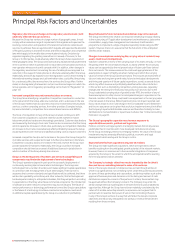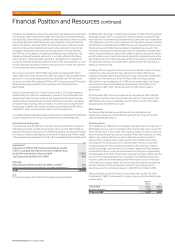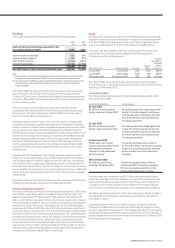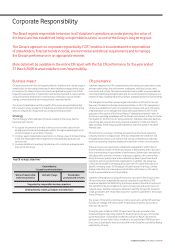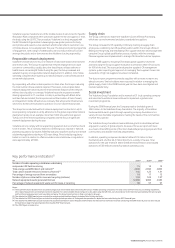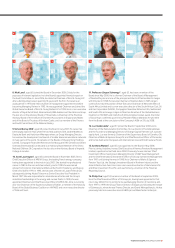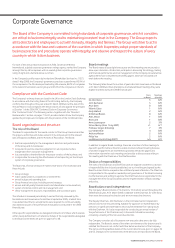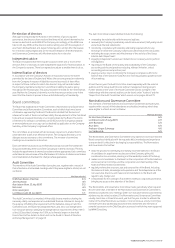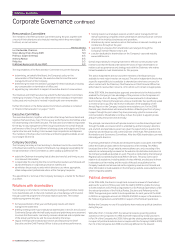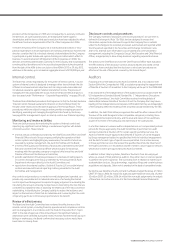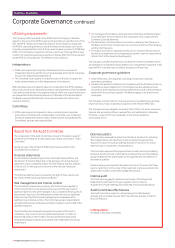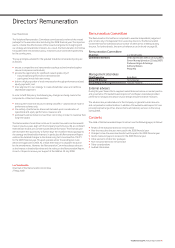Vodafone 2008 Annual Report Download - page 63
Download and view the complete annual report
Please find page 63 of the 2008 Vodafone annual report below. You can navigate through the pages in the report by either clicking on the pages listed below, or by using the keyword search tool below to find specific information within the annual report.
Vodafone requires manufacturers of the mobile devices it sells to test for Specific
Absorption Rate compliance when used both against the ear and against, or near,
the body, using the US FCC Test procedure. Vodafone is actively engaged with
the IEC Standards Organisation in developing a new global protocol for body
worn phones and expects a new standard, which better reflects customers’ use
of mobile devices, to be adopted later this year. The Group’s long term programme
of engagement, with a range of stakeholders, aims to reduce levels of concern
amongst the public and to demonstrate that Vodafone is acting responsibly.
Responsible network deployment
Vodafone’s mobile services rely on a network of radio base stations that transmit
and receive calls. The Group recognises that network deployment can cause
concern to communities, usually about the visual impact of base stations or
health issues concerning RF fields. During the year, the Group reviewed and
updated its policy on responsible network deployment. In addition, nine mobile
operating companies have signed up to national industry codes of best practice
on network deployment.
By cooperating with other mobile operators to share sites, the Group is reducing
the total number of base stations required. This lowers costs, enables faster
network deployment and reduces the environmental footprint of the network
without loss of quality or coverage. Vodafone has active or passive network
sharing agreements in 17 countries. In India, in partnership with Bharti Airtel
and Idea Cellular Limited, the Group announced the creation of Indus Towers,
an independent mobile infrastructure company that will provide infrastructure
services to all telecommunications operators on a non-discriminatory basis.
The Group has conducted audits of network deployment contractors in all its
local operating companies to verify adherence to the global responsible network
deployment policy. As an example, more than 1,000 site audits took place in
Turkey, one of the newest operating companies and the focus of significant
network deployment during the year.
Vodafone aims to comply with local planning regulations but is sometimes found
to be in breach. This is normally related to conflicting local, regional or national
planning regulations. During the 2008 financial year, Vodafone was found in breach
of planning regulations relating to 423 mast sitings. Fines levied by regulatory
bodies or courts in relation to offences under environmental law or regulations
were approximately £61,000.
Supply chain
The Group continues to implement Vodafone’s Code of Ethical Purchasing,
which sets out environmental and labour standards for suppliers.
The Group increased its CR capability in China by training all supply chain
employees, establishing two CR qualified auditors within the Group’s offices in
Beijing and Hong Kong and embedding CR in supplier selection and management
using the Group’s global qualification process. A project with two strategic
Chinese suppliers was implemented to manage CR risk within sub-tier suppliers.
A total of 488 suppliers, including 63 strategic global suppliers, have been
assessed using the Group’s supplier evaluation scorecard in which CR accounts
for 10% of the total. The scorecard evaluates the supplier’s CR management
systems, public reporting and approach to managing their suppliers. Seven site
evaluations of high risk suppliers have been completed.
The duty to report programme provides suppliers with a means to report any
ethical concerns. Twelve incidents were reported in relation to managing the
global supply chain in the 2008 financial year. All have been investigated and
resolved satisfactorily.
Social investment
The Vodafone Group Foundation and its network of 21 local operating company
and associate foundations have continued to implement a global social
investment programme.
During the 2008 financial year, the Company made a charitable grant of
£24.0 million to the Vodafone Group Foundation. The majority of foundation
funds are distributed in grants through operating company foundations to a
variety of local charitable organisations meeting the needs of the communities
in which they operate.
The Vodafone Group Foundation made additional grants to charitable partners
engaged in a variety of global projects. Its areas of focus are: sport and music
as a means of benefiting some of the most disadvantaged young people and their
communities, and disaster relief and preparedness.
In addition, operating companies donated a further £12.9 million to their
foundations and a further £4.2 million directly to a variety of causes. Total
donations for the year ended 31 March 2008 were £44.9 million and included
donations of £3.8 million towards foundation operating costs.
Key performance indicators(1)
KPI 2008
(2) 2007(3) 2006(4)
Number of mobile operating subsidiaries undertaking
independent RF field monitoring 15 15 15
Total energy use (GWh) (direct and indirect)(5) 2,996 2,690 2,900
Total carbon dioxide emissions (millions of tonnes)(5) 1.45 1.23 1.31
Percentage of energy sourced from renewables 18 17 12
Number of phones collected for reuse and recycling (millions) 1.33 1.03 1.37
Network equipment waste generated (tonnes) 12,096 9,960 2,950
Percentage of network equipment waste sent for reuse or recycling 96 97 97
Notes:
(1) These performance indicators were calculated using actual or estimated data collected by the Group’s mobile operating companies. The data is sourced from invoices, purchasing requisitions,
direct data measurement and estimations where required. The carbon dioxide emissions figure is calculated using the kWh/CO2 conversion factor for the electricity provided by the national grid
and for other energy sources in each operating company. The Group’s joint venture in Italy is included in all years.
(2) The data for the 2008 financial year excludes the newly acquired Vodafone Essar in India and Tele2 in Italy and Spain.
(3) The data for the 2007 financial year excludes the newly acquired operations in Turkey and the operations in Japan that were sold during the 2007 financial year.
(4) The data for the 2006 financial year excludes the acquired businesses in Czech Republic and Romania and the business in Sweden that was sold during the 2006 financial year, but does include
the business in Japan that was disposed of during the 2007 financial year.
(5) The 2007 figure includes Arcor.
Vodafone Group Plc Annual Report 2008 61



